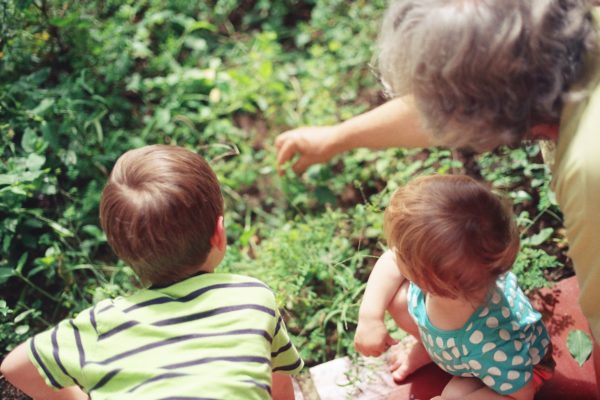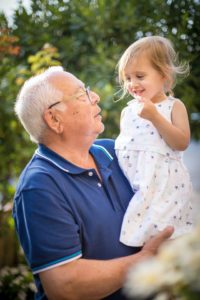Blog
Intergenerational learning as a pedagogical strategy in ECE services

Community and public spaces can serve as rich and innovative learning environments for children by using intergenerational learning (IGL) as a pedagogical strategy. This was a key finding of a recent PhD study about IGL in early childhood education (ECE) services in Ireland conducted by Dr. Anne Fitzpatrick. The study demonstrates how IGL offers a contemporary take on a long-established belief that it takes a village to raise a child.
I undertook this study to explore the perspectives of educators (5), children (70) and their parents (43) who had been involved in IGL in their ECE services in Ireland. All of the educators had completed the TOY online course, following which they had introduced a wide range of IGL experiences in their ECE services. These included visits to care homes, independent living centres, day centres for older adults and a Men’s Shed as well as welcoming older adults and grandparents into their ECE services.
The research was undertaken before the outbreak of the COVID-19 pandemic but, given the isolation experienced by many, the findings may be more relevant than ever.
Educators in the study strongly supported the view that learning is a social process. They believed that children attending ECE services should be exposed to diverse social situations beyond the walls of the ECE service. They also argued that IGL offers an excellent example of children’s learning and development being enhanced through relationships and experiences with older adults who are not trained or paid as educators. This fits with Rogoff’s ideas about children learning through observing and pitching in to family and community endeavours (Rogoff, 2014), and could be described as the curriculum of ordinary life. Through their relationships with older adults in real-life community contexts, such as day care centres for older adults, the children developed valuable knowledge (e.g., history, culture, the life cycle) and socio-emotional and life skills, including initiative, empathy, resilience, confidence and self-control. This is expertise that could not have been taught or learned within the ECE service, as described here by one of the participating educators in the study:
… those children going down to the day centre, we’re seeing empathy being built up … some of the older people have no speech … and to see the children actually understanding them and supporting people to do things … that’s all amazing stuff … and it’s so natural to the children …

Through IGL, children (aged 3 to 5 years) in this study had interesting and challenging development opportunities, were immersed in the lives of older adults in the wider community and learned by observing and pitching in with support from educators. As noted by another educator in the study:
… I think if the children don’t have that exposure … it’s a loss of real learning …
Parents also valued highly the knowledge, skills and attitudes that they observed in their children as a result of their IGL experiences. IGL ensures that learning is not a separate activity isolated from everyday life but that learning in the community enables and encourages children to develop culturally-valued skills and knowledge. Educators also highlighted IGL as an enjoyable and empowering pedagogical strategy for children.
Another significant finding of the study was that IGL created rich opportunities for children to genuinely participate as fully-fledged citizens in local communities. Children enhanced the lives of older adults through their non-judgemental attitudes, energy, creativity and friendship and showed high levels of understanding and expertise in contributing to the IGL experiences. One of the parents noted:
… Monday is my child’s favourite day because she knows she is going to the nursing home … she always wants to wear something nice …
Children also became more visible in the community as they walked to and from the older adults’ services, resulting in children and adults of all ages engaging with each other in public spaces. This growing sense of awareness, identity and belonging in local spaces and places helped to embed children as citizens in their communities, which is increasingly important as children and older adults are spending more time in age-segregated spaces. Here one of the educators describes the significance of these:
… we are focused on letting people know that children are part of this community ...
Finally, opening up the ECE service to older adults through IGL allowed different generations to share interests and environments. This resulted in rich and meaningful relationships and friendships being built, as noted by one of the educators:
… that is where I would love to see early years services going … linking in with communities, nursing homes, disability services … just getting linked up with the community …
In creating what could be termed intergenerational contact zones, educators highlighted a key benefit of IGL in ECE services: its potential to address societal challenges including segregation of generations, isolation, lifelong learning and family change.
References
Rogoff, B. (2014). Learning by observing and pitching in to family and community endeavours: An orientation. Human Development, 57(3), 69-81.
___________
The study was undertaken by Dr. Anne Fitzpatrick, a member of the TOY Consortium and until recently a lecturer in ECE in Technological University Dublin. She can be contacted at anne.fitzpatrick@tudublin.ie
The complete PhD thesis, undertaken in TU Dublin, can be accessed at https://arrow.tudublin.ie/appadoc/106/